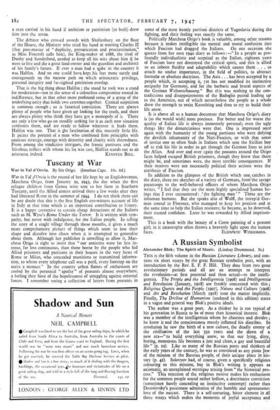Tuscany at War
War in Val d'Orcia. By Iris Origo. (Jonathan Cape. 10s. 6d.) War in Val d'Orcia is the record of her life kept by an Englishwoman, Marchesa Origo, from January 30, 1943, the day when the first refugee children from Genoa were sent to her farm in Southern Tuscany, until the Allied armies arrived there a few weeks after they had liberated Rome in the summer of 1944. I do not think there can be any doubt that this is the first English eye-witness account of life in Italy at that time which is an important contribution to history. It is a happy corrective to certain cheap detractions of the Italians such as M. Wyss's Rome Under the Terror. It is written with sym- pathy, but never with indulgence, for the Italian people. In telling the story of a single' village through those months, it gives a much more comprehensive picture of things which seem to lose their shape and dissolve into chaos when it is attempted to generalise about them. Although her publisher is unwilling to allow it, Mar- chesa Origo is right to insist that "our anxieties were far less in- tense, far less continuous, than those borne by the people who hid Allied prisoners and partisans in their houses in the very heart of Rome or Milan, who concealed munitions or transmitted informa- tion, to whom every telephone call was a peril, every footstep on the stairs a menace." In the country urban flames of enthusiasm are cooled by the perennial " apathy " of peasants almost everywhere, a feeling they have of the hopelessness of struggling against external forces. I remember seeing a collection of letters from peasants in some of the most keenly partisan districts of Yugoslavia during the fighting, and their feeling was exactly the same. Politically Marchesa Origo's book is valuable, among other reasons because it makes intelligible the mental and moral confusion into which Fascism had dragged the Italians. On one occasion she quotes from her own 1940 diary as follows :—" In a people as pro-. foundly individualistic and sceptical as the Italian, eighteen. years of Fascism have not destroyed the critical spirit, and this is allied to an inborn fluidity and adaptability which causes them . . . to attach no undue importance, in the field of politics, to abstract formulw or absolute doctrines. The Axis. .. has been accepted by a people which, in accepting it, yet has not modified its instinctive antipathy for Germany, and for the barbaric and brutal • aspects of the German Weltanschauung." But this was nothing to the con- tradictions and disappointments of the Badoglio period leading up to the Armistice, out of which nevertheless the people as a whole drew the strength to resist Kesselring and then to try to build their life anew.
It is above all as a human document that Marchesa Origo's diary is (as she would wish) most precious. For better and for worse the quality of Italian life is always immensely personal; even the ugly things like the denunciations were that. One is impressed once again with the humanity of the young partisans who were defying the devilish inhumanity of the Nazi-Fascists, or with that sense of justice one so often finds in Italians which sent the Sicilian boy off to risk his life in order to get through the German lines to join the Allies. And over and over again the peasants around the Origo farm helped escaped British prisoners, though they knew that there might be, and sometimes Were, the most terrible consequences. If their motives were not necessarily political their actions were the antithesis of Fascism.
In addition to the glimpses of the British which onelcafc.hes in the diary, there are sketches of a Variety of Germans, from-the savage paratroops to the well-behaved officers of whom Marchesa Origo writes, "I feel that they are the most -highly specialised human be- ings that I ever encountered : 'the fighting man'" These are- the inhuman humans. But she speaks also of Wolff, the intrepid Ger- man consul in Florence, who managed to keep his position and at the same time to help the Italian resisters; he became, as he deserved, their trusted confidant. Later he was rewarded by Allied imprison- ment.
This is a book with the beauty of a Corot painting of a peasant girl; in it catastrophe often throws a heavenly light upon the human


































 Previous page
Previous page